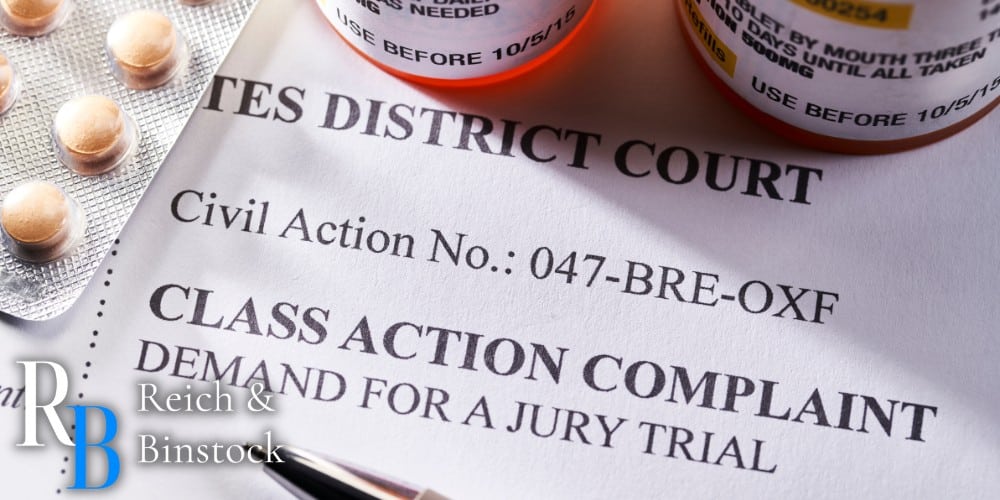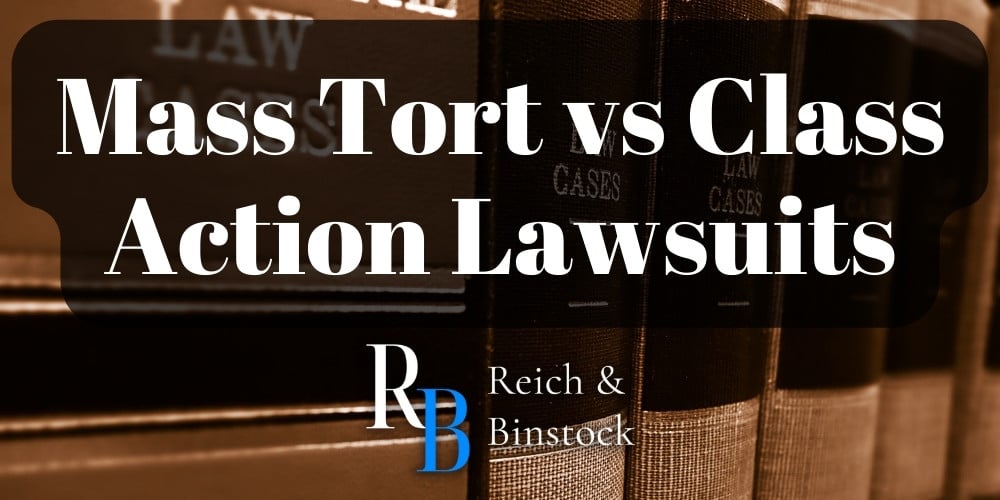Because of their similarities, many people confuse class action and mass tort lawsuits with each other. However, they have notable differences and should not be used as interchangeable terms. The main ways in which these two case types differ lie in their procedures and in how the multiple plaintiffs are compensated. In this blog, the mass tort lawyers at Reich & Binstock will explain the differences between mass tort vs class action lawsuits.
At Reich & Binstock, our Houston personal injury lawyers have extensive experience handling individual lawsuits, class actions, and mass tort litigation. If you have been affected by defendants involved in a mass tort lawsuit or class action lawsuit, you need the help of experienced mass tort attorneys. To schedule a free consultation with us about your case, please call our office at 713-622-7271 today.
Is Mass Tort the Same as Class Action?
No. A mass tort case arises when an attorney brings multiple lawsuits against a defendant or a group of defendants. These lawsuits are generally filed at the same time. A class action suit, however, occurs when many plaintiffs are grouped together in one single lawsuit. The most important distinctions lie in how the individual plaintiffs are treated throughout the process. In the following sections, we outline the specifics of mass torts and class action suits.
What Is a Mass Tort Claim?
Tort cases simply refer to those involving some form of injury. Therefore, mass tort claims involve a large number of people being harmed by the same defendant or defendants. In general, the large group of plaintiffs will have similar injuries, similar damages, and similar grievances with the defendant/s. Mass tort plaintiffs may file their claims either in state court or federal court.
Types of Mass Tort Cases

Certain types of cases are much more common when it comes to mass torts. Below, we outline some of the most common case types that tend to lead to mass tort actions.
- Defective drugs: If a drug manufacturer is aware of a dangerous side effect of their medication, but they fail to warn consumers about it, they could face legal action. Drug injury claims are common when it comes to mass torts.
- Defective medical devices: The same concept of liability applies in defective medical device cases. If a product designer or manufacturer creates an unreasonably dangerous product, they could be held liable for the injuries that the product causes.
- Product liability: This is a broader category of mass torts that encompasses defective drug and medical device cases. Any mass tort action that involves suing a product designer or manufacturer for the injuries it caused can be considered a product liability claim.
- Toxic exposure: If large numbers of people suffer injuries or illnesses as a result of their exposure to toxic substances, they can often pursue a mass tort claim. Whoever is responsible for the exposure can be held liable for the damages that plaintiffs suffered.
- Large-scale disasters: Certain disasters, such as wildfires or plant explosions, can result in mass tort claims. If one defendant or a group of defendants engages in negligent behavior that causes a large-scale disaster, they can be held accountable with a mass tort claim.
- Insurance claims: Lastly, large insurance companies can also be the targets of mass torts. For example, let’s say that a natural disaster devastates an area. If insurance companies fail to fairly pay claims for those affected, they could be hit with a mass tort case.
How Mass Torts Work
Generally speaking, mass torts involve bringing together a large group of individual lawsuits into one larger suit against an entity. In most cases, individual plaintiffs will share the same grievance or similar grievances against the defendant/s in question. Importantly, mass torts can also be a form of multidistrict litigation, meaning the plaintiffs can either live close together or far apart.
It’s important to remember that, although the plaintiffs may have suffered the same or similar injuries, the severity of their damages can differ greatly.
What Is a Class Action Lawsuit?
A class action lawsuit is a form of civil procedure in which many plaintiffs have suffered the same or similar injuries because of the negligent actions of the same defendants. All of the individual lawsuits are combined into one larger suit to achieve power in numbers. Additionally, at least one of the class members must act as a class representative for the entire class action.
How Do Class Actions Work?
Because many people are involved in class actions, any settlement awards for the claim will be split among the plaintiffs according to the damages they suffered. It is also possible to have multiple class representatives or lead plaintiffs. These individuals represent the entire group of class members in court, and they also hire a class action lawyer.
A class action lawsuit must also go through a process called certification. Certifying class action lawsuits must occur before these court cases may proceed. The class action certification process determines whether or not pursuing a class action lawsuit is the best option for the cases in question. Some states have different rules when it comes to certifying a class action, but most states take the following factors into consideration.
- Number of plaintiffs
- Similar questions of facts or laws
- Similarities between the claims
- Representative plaintiff must be able to adequately protect the interests of the class members
- Whether or not there are enough differences between the plaintiffs to establish subclasses
What Types of Cases Involve Mass Torts and Class Actions?

Any litigation process in which many people were harmed in similar ways by the same product or defendant has the potential to become a mass tort or class action claim. Some of the most common case types include defective products, medical devices, or prescription drugs, as well as toxic exposure, insurance claims, and even certain claims against product designers or manufacturers. Below, we list some of the tort claims that the attorneys at Reich & Binstock handle.
- Drug injuries
- Defective medical devices
- Sexual abuse claims
- Water contamination
- Herbicide litigation
- Pesticide litigation
- Auto defects
- Camp Lejeune lawsuits
- NEC baby formula lawsuits
Contact a Mass Tort and Class Action Lawyer Today
If you or someone you love has suffered injuries or financial losses as a result of a dangerous product or medication, we strongly recommend seeking your own legal counsel. At Reich & Binstock, our attorneys regularly monitor new and existing multidistrict litigation cases, as well as any changes to the federal rules specifically designed to regulate them. If you are involved in a multi-district litigation claim, contact our law firm as soon as possible. Schedule your free consultation with us by calling 713-622-7271 or filling out our online intake form today.













